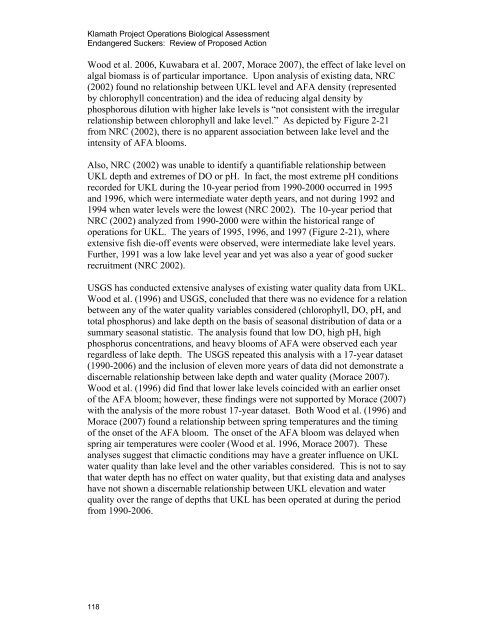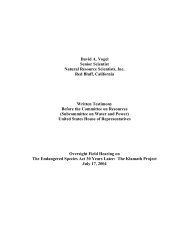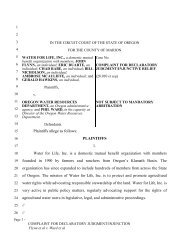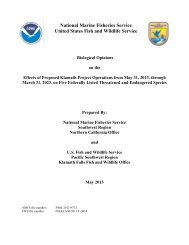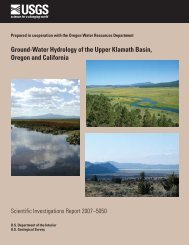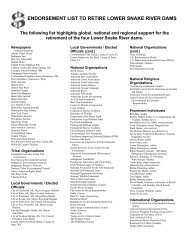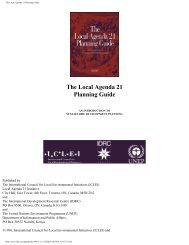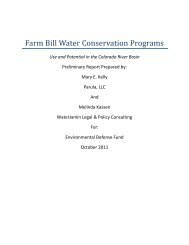Our new Biological Assessment is out - Klamath Basin Crisis
Our new Biological Assessment is out - Klamath Basin Crisis
Our new Biological Assessment is out - Klamath Basin Crisis
You also want an ePaper? Increase the reach of your titles
YUMPU automatically turns print PDFs into web optimized ePapers that Google loves.
<strong>Klamath</strong> Project Operations <strong>Biological</strong> <strong>Assessment</strong><br />
Endangered Suckers: Review of Proposed Action<br />
Wood et al. 2006, Kuwabara et al. 2007, Morace 2007), the effect of lake level on<br />
algal biomass <strong>is</strong> of particular importance. Upon analys<strong>is</strong> of ex<strong>is</strong>ting data, NRC<br />
(2002) found no relationship between UKL level and AFA density (represented<br />
by chlorophyll concentration) and the idea of reducing algal density by<br />
phosphorous dilution with higher lake levels <strong>is</strong> “not cons<strong>is</strong>tent with the irregular<br />
relationship between chlorophyll and lake level.” As depicted by Figure 2-21<br />
from NRC (2002), there <strong>is</strong> no apparent association between lake level and the<br />
intensity of AFA blooms.<br />
Also, NRC (2002) was unable to identify a quantifiable relationship between<br />
UKL depth and extremes of DO or pH. In fact, the most extreme pH conditions<br />
recorded for UKL during the 10-year period from 1990-2000 occurred in 1995<br />
and 1996, which were intermediate water depth years, and not during 1992 and<br />
1994 when water levels were the lowest (NRC 2002). The 10-year period that<br />
NRC (2002) analyzed from 1990-2000 were within the h<strong>is</strong>torical range of<br />
operations for UKL. The years of 1995, 1996, and 1997 (Figure 2-21), where<br />
extensive f<strong>is</strong>h die-off events were observed, were intermediate lake level years.<br />
Further, 1991 was a low lake level year and yet was also a year of good sucker<br />
recruitment (NRC 2002).<br />
USGS has conducted extensive analyses of ex<strong>is</strong>ting water quality data from UKL.<br />
Wood et al. (1996) and USGS, concluded that there was no evidence for a relation<br />
between any of the water quality variables considered (chlorophyll, DO, pH, and<br />
total phosphorus) and lake depth on the bas<strong>is</strong> of seasonal d<strong>is</strong>tribution of data or a<br />
summary seasonal stat<strong>is</strong>tic. The analys<strong>is</strong> found that low DO, high pH, high<br />
phosphorus concentrations, and heavy blooms of AFA were observed each year<br />
regardless of lake depth. The USGS repeated th<strong>is</strong> analys<strong>is</strong> with a 17-year dataset<br />
(1990-2006) and the inclusion of eleven more years of data did not demonstrate a<br />
d<strong>is</strong>cernable relationship between lake depth and water quality (Morace 2007).<br />
Wood et al. (1996) did find that lower lake levels coincided with an earlier onset<br />
of the AFA bloom; however, these findings were not supported by Morace (2007)<br />
with the analys<strong>is</strong> of the more robust 17-year dataset. Both Wood et al. (1996) and<br />
Morace (2007) found a relationship between spring temperatures and the timing<br />
of the onset of the AFA bloom. The onset of the AFA bloom was delayed when<br />
spring air temperatures were cooler (Wood et al. 1996, Morace 2007). These<br />
analyses suggest that climactic conditions may have a greater influence on UKL<br />
water quality than lake level and the other variables considered. Th<strong>is</strong> <strong>is</strong> not to say<br />
that water depth has no effect on water quality, but that ex<strong>is</strong>ting data and analyses<br />
have not shown a d<strong>is</strong>cernable relationship between UKL elevation and water<br />
quality over the range of depths that UKL has been operated at during the period<br />
from 1990-2006.<br />
118


